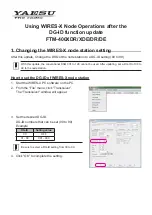
Listening to your system
5
5
38
4
62
7
a.
You can change the MIDNIGHT/LOUDNESS options at any
time by using
MIDNIGHT
button.
b.
You can change the Sound Retriever feature at any time by
using
S.RETRIEVER
button.
c.
The default setting when the
iPod/USB
,
ADAPTER
,
NETRADIO
,
PANDORA
,
M.SERVER
or
FAVORITE
input is
selected is
ON
.
d.
This setting works only with dual mono encoded Dolby Digital
and DTS soundtracks.
e.
The initial set
AUTO
is only available for Dolby TrueHD signals.
Select
MAX
or
MID
for signals other than Dolby TrueHD.
f.
You shouldn’t have any problems using this with most SACD
discs, but if the sound distorts, it is best to switch the gain
setting back to
0
dB.
g.
This feature is only available when the connected display
supports the automatic audio/video synchronizing capability
(‘lip-sync’) for HDMI. If you find the automatically set delay time
unsuitable, set
A.DLY
to
OFF
and adjust the delay time
manually. For more details about the lip-sync feature of your
display, contact the manufacturer directly.
h.
Only available with 2-channel sources in
DOLBY PLII MUSIC
mode.
i.
Only when listening to 2-channel sources in
NEO:6 CINEMA
and
NEO:6 MUSIC
mode.
DRC
(Dynamic Range Control)
Adjusts the level of dynamic range for movie
soundtracks optimized for Dolby Digital, DTS,
Dolby Digital Plus, Dolby TrueHD, DTS-HD
and DTS-HD Master Audio (you may need to
use this feature when listening to surround
sound at low volumes).
AUTO
e
MAX
MID
OFF
LFE ATT
(LFE Attenuate)
Some Dolby Digital and DTS audio sources
include ultra-low bass tones. Set the LFE
attenuator as necessary to prevent the ultra-
low bass tones from distorting the sound from
the speakers.
The LFE is not limited when set to 0 dB, which
is the recommended value. When set to –15
dB, the LFE is limited by the respective
degree. When OFF is selected, no sound is
output from the LFE channel.
0
(0 dB)
5 (–5 dB)
10 (–10 dB)
15 (–15 dB)
20 (–20 dB)
** (OFF)
SACD G.
(SACD Gain)
f
Brings out detail in SACDs by maximizing the
dynamic range (during digital processing).
0
(0 dB)
+6 (+6 dB)
HDMI
(HDMI Audio)
Specifies the routing of the HDMI audio signal
out of this receiver (
AMP
) or through to a TV
(
THRU
). When
THRU
is selected, no sound is
output from this receiver.
The HDMI Audio setting cannot be switched
while performing synchronized amp mode
operations (
page 55
).
AMP
THRU
A.DLY
(Auto Delay)
g
This feature automatically corrects the audio-
to-video delay between components
connected with an HDMI cable. The audio
delay time is set depending on the operational
status of the display connected with an HDMI
cable. The video delay time is automatically
adjusted according to the audio delay time.
OFF
ON
C.WIDTH
(Center Width)
h
(Applicable only when using a center speaker)
Spreads the center channel between the front
right and left speakers, making it sound wider
(higher settings) or narrower (lower settings).
0 to 7
Default:
3
Setting/What it does
Option(s)
DIMEN
(Dimension)
h
Adjusts the surround sound balance from
front to back, making the sound more distant
(minus settings), or more forward (positive
settings).
–3 to +3
Default:
0
PNRM.
(Panorama)
h
Extends the front stereo image to include
surround speakers for a ‘wraparound’ effect.
OFF
ON
C.IMG
(Center Image)
i
(Applicable only when using a center speaker)
Adjust the center image to create a wider
stereo effect with vocals. Adjust the effect
from
0
(all center channel sent to front right
and left speakers) to
10
(center channel sent
to the center speaker only).
0 to 10 Default:
3
(NEO:6 MUSIC),
10
(NEO:6
CINEMA)
H.GAIN
(Height Gain)
Adjusts the output from the front height
speaker when listening in
DOLBY PLIIz
HEIGHT
mode. If set to
H
, the sound from the
top will be more emphasized.
L (Low)
M
(Mid)
H (High)
Setting/What it does
Option(s)
VSX-43_CUXE_En.book 38 ページ 2013年1月18日 金曜日 午前11時25分
















































